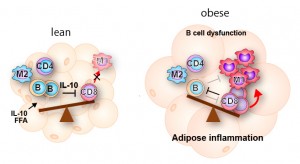Why does inflammation occur in obese fat tissue? Mechanism of action of regulatory B cells in obese mouse adipose

Changes of diet and lack of exercise in modern lifestyles have brought about an increase in the incidence of obesity and metabolic syndrome, which are attracting the attention of researchers as major risk factors for cardiovascular events such as heart attacks and strokes. While it is thought that metabolic syndrome is accompanied by a chronic inflammatory response in obese adipose tissue that brings about these symptoms, the mechanisms by which this comes about are not well understood. In 2009, researchers at the University of Tokyo’s Department of Cardiovascular Medicine including Associate Professor Satoshi Nishimura (Translational Systems Biology and Medicine Initiative), Lecturer Ichiro Manabe, Emeritus Professor Ryozo Nagai and their colleagues found that CD8+ T-cells (also known as killer T-cells) brought about adipose inflammation.

© Satoshi Nishimura, Ichiro Manabe, Ryozo Nagai, Adipose tissue inflammation regulated by immune cells. Adipose tissue inflammation is positively regulated by CD8+ T cells and M1 macrophages and negatively regulated by regulatory B cells. In this study, researchers elucidated the mechanism by which the novel regulatory B cells in adipose tissue suppress adipose tissue inflammation through the cytokine Interleukin-10.
In this latest research, the group reports for the first time that regulatory B cells in mouse adipose tissue have anti-inflammatory properties. Further, they also report that these B cells are reduced in obesity both in mice and humans. As a result, it is possible that inflammation is brought about by an imbalance in the cells promoting and suppressing inflammation. The group also found that Interleukin-10 produced by B cells is vital for B cell function. Based on these findings, it is expected that regulatory B cells will prove a novel therapeutic target for metabolic syndrome.
This study was supported by the Funding Program for Next Generation World-Leading Researchers, Funding Program for World-Leading Innovative R&D on Science and Technology (FIRST Program), and the Translational Systems Biology and Medicine Initiative from JST.
Press release (Japanese)
Paper
Satoshi Nishimura, Ichiro Manabe, Satoshi Takaki, Mika Nagasaki, Issei Komuro, Takashi Kadowaki, and Ryozo Nagai,
“Adipose natural regulatory B cells negatively control adipose tissue inflammation”,
Cell Metabolism Online Edition: 2013/10/24, doi: 10.1016/j.cmet.2013.09.017.
Article link
Links
The University of Tokyo Hospital
Department of Cardiovascular Medicine, The University of Tokyo Hospital (Japanese)







